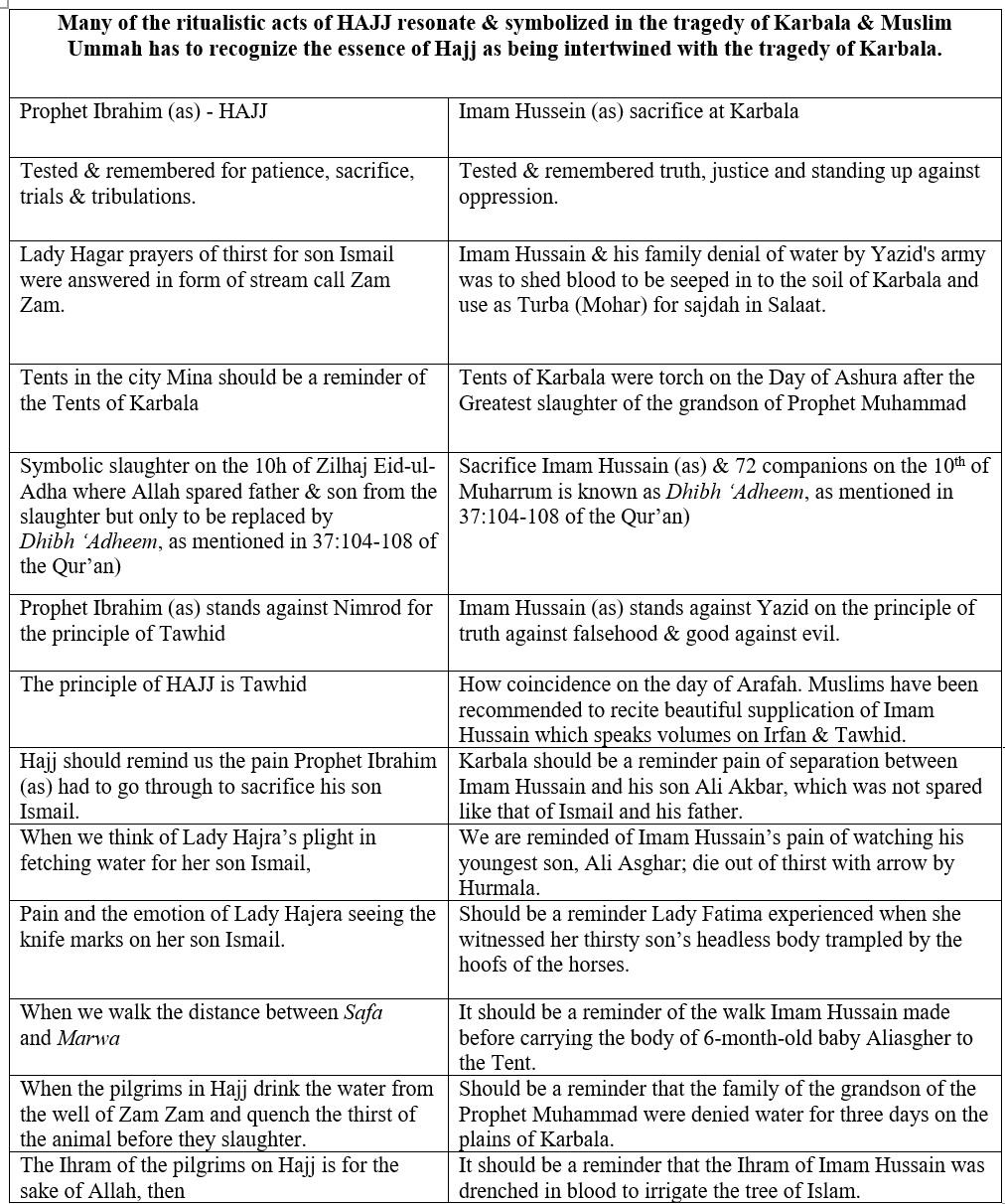What is the significance of the month of Zilhaj and the important event in this holy month?
Many of the ritualistic acts of HAJJ resonates, symbolized and is intertwined in the tragedy of Karbala.
The crescent of Zilhaj will lit the sky around July 1st and within thirty days the new year of Islamic calendar will begin. The sorrowful month of Muharram.
Muharrum will emerge, bringing along with it all its grief, sadness, and mourning as the Islamic New Year commences.
In the year 60 A.H. when Imam Hussain (PBUH) and his family made the intention to perform Hajj, however, just before the commencement of the pilgrimage, he suddenly had to leave Mecca without performing Hajj!
The huge crowds were entering Mecca for Hajj, while Imam Hussain was going out of that Holy City with his family and followers.
This strange event must have elicited questions in the minds of many as to why the grandson of the Holy Prophet was leaving Mecca just on the eve of Hajj without performing Hajj.
Why did he leave Mecca?
The main reason for Imam leaving Mecca was that Imam did not want to be killed in a manner that might remain mysterious and impossible to apprehend the killer.
Imam Hussain’s ultimate aim and goal was to expose Yazid, who had seek for Bayat – allegiance from Imam in Medina.
Imam Hussain was determined not to give his allegiance to the corrupt oppressor and left for Karbala.
What is the significance of the month of Zilhaj and the important event in this holy month?
Zilhaj is a very sacred month in the Islamic calendar, one in which the Hajj (Pilgrimage), Arafah, and three Eid - Eid ul Adha, Eid ul Ghadeer and Eid Mubahila takes place.
The month of Zilhaj is the month of the Pilgrimage which has recommended Fasting followed day of Arafah.
The day of Arafah is where Allah perfected the religion of Islam. It is also momentous because it was the day an important verse of the Qur'an, Surah al Maa'idah 5:3, was revealed.
Du'a’ e-Arafah was recited by Hussain ibn Ali, during the Hajj at Mount Arafat from Zuhr prayer to sunset. Below is the link in English and Arabic.
English recitation of Dua-e-Arafah
Truly beautiful, thought provoking, & extremely spiritual dua-e-Arafah by the grandson of the Holy prophet Muhammad, Master of the Martyrs – Imam Hussain.
While the Eid ul Ghadeer is held on 18 Zilhaj where Prophet Muhammad appointed Ali ibn Abi Talib as his successor by the divine revelation.
This event happened at a pond of Ghadeer when pilgrims were returning from the Hajj.
Prophet Muhammad gathered all the Muslims to deliver a beautiful sermon. Below is the link of the book/sermon:
http://gadir.free.fr/eng/books/Ghadir_Sermon.pdf
The next event is the event of Mubahila on 24th Zilhaj where Prophet Muhammad emerged with only selected members of his family, carrying Hussain in his arm with Hasan holding his hand, followed by Fatima and Ali to dialogue with the Christians delegation from Najran.
Than comes the month of Muharrum and Safar where Shia Muslims will attend nightly sermons and participate in all rituals of the Azadari (lamenting) over the tragedy of Karbala.
However, we Muslims cannot remain at the stage of emotion, it is imperative for us to proceed to the next level, where we contemplate over the lessons, moral and wisdom that we have learned during the gatherings and the lectures of Muharrum.
One must ask why Imam Hussain made this journey knowing well that that he, his family and companions will be killed on the plains of Karbala and his women and children will be taken captives to be paraded in the streets of Damascus (Sham) and Kufa.
Question? Was the sacrifice of Imam Hussain and his family for the Muslim Ummah to simple cry and beat our chest or to take some action against the pharaohs, Nimrod and Yazid to today.
Muslims should reflect on the event of HAJJ and Karbala to extract lessons to benefit oneself and the community. After all, as Imam Hussain said his goal is
“I did not revolt for the cause of tranny and corruption, but to reform my grandfather’s nation. And to enjoin the good and denounce the evil.”
In a different period, it was Prophet Ibrahim (A.S) with his wife Hagar and their infant son Ismail (A.S), who had made their journey towards the desert plains of Makkah.
The life of Ibrahim (PBUH) and his family and that of Hussain (PBUH) and his family seem to be intertwined with each other despite centuries separating the two, the trajectory of their life bears remarkable resemblance.
Ibrahim stood up to Nimrod and his tyranny while Hussain did the same against Yazid. Both, Ibrahim and Hussain made that Hijrah with perseverance, patience and ultimate sacrifice, one can’t miss the obvious parallels.
The journey of Hajj and Karbala are also intertwined, both Karbala and Hajj are about giving up worldly pleasure for the sake of God.



